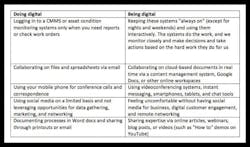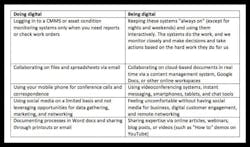Moving from "doing" digital to "being" digital in the IIoT era
By Kevin Clark, vice president of Fluke Reliability
Even before the COVID-19 outbreak, maintenance and reliability professionals were at a crossroads in how to best serve organizations.
Experienced people are retiring, younger workers with new ideas are joining the ranks, and technology advancements continue to impact workforces. But budgets are tight, there's lots to learn, positions go unfilled, and executives don't always buy-in. On top of that, change of any kind is challenging.
Add to this complicated mix the more rigorous safety requirements, work-from-home options, and other changes, thanks to the pandemic.
One way those of us who maintain industrial assets can prove our business value to senior leadership and potential customers is to develop a digital-first mindset. Among other things, this includes fully leveraging the array of cloud-friendly digital tools available to us—and not just learn and use them because you're asked to, but because it is the best thing for you, your assets, and your company.
Also read: Lessons to be learned from the latest supply chain glitch
It also includes building an online "presence" via communications platforms, social media networks, and digital communities—not just logging in when you have to submit a report or check messages. Overall, it may require not just adapting but embracing a digital workstyle.
I call it "being digital"; I discuss this below.
Demand for digital skills only increasing
The vast majority of all manufacturing jobs will soon require a "medium to high digital skills level." But many working Americans still don't know how to use email or the internet or have even elementary digital skills. Training within private industry is limited and declining. As a result, much of the learning must be on-the-job experience and/or self-learning.
For the record, I'm not a digital native myself. I've been a Certified Maintenance & Reliability Professional (CMRP) since 2004 and have more than 30 years of experience in operations leadership. When I started my career, the internet had yet to become the life-changing medium that it is.
But I firmly believe that digital tools—computerized maintenance management systems (CMMS), Industrial Internet of Things (IIoT) platforms, chat tools, videos, smartphones, social-media networks, and cloud-based apps, among others—will make maintenance and reliability more productive and more profitable in the years ahead. We've made some progress in digitalizing condition monitoring so that asset management is more data-driven and efficient. But we are nowhere near where we need to be as an industry.
Being digital versus doing digital
To become an asset-management leader in this decade, you're going to have to "be digital" rather than just "doing digital."
What do I mean by that? "Being digital" is developing the mindset that compels you to, over time, instinctively choose digital solutions first.
It may mean texting instead of calling someone. It may mean searching Google or Bing for a part or tool or an answer to a question before sending an email. It may mean leveraging social media to connect with colleagues or industry SMEs for help and thought leadership, rather than just using it for outside-of-work activities. It may mean doing something differently than the way you've always done it.
"Doing digital" is begrudgingly using various digital tools only when and because you have to do so as part of your job. Here are some examples of what I mean:
Reasons for advancing your digital skills and knowledge
Yes, many people may not get excited about having to develop new tools and technical skills, especially after years of proving themselves in a given specialty or discipline. Indeed, some amount of learning is involved in leveraging the benefits of digital tools and improving processes and workflows as a team.
Here are some reasons this learning is worth your while:
- Reduced dependence on tribal knowledge. Key employees leaving will always result in a loss of institutional and other expertise that is difficult to lose. But documenting asset-maintenance processes, practices, lessons and insights through digital means helps retain some of it. What's more, you can now find much of what you need to know through online searches, YouTube videos, webinars and podcasts. "Being digital" includes being savvy at searching. The answer you are seeking is likely somewhere in the cloud.
- Communication improves. Having all team members online daily to a CMMS or communications platform makes spreading the word about asset-condition changes, workorder schedules, updates, announcements, etc., much easier and more efficient. What's even better is each team member actively engaging regularly with colleagues via such platforms to share, learn and stay informed.
- Higher engagement likely means more significant company investment. Tools frequently used by most or all team members justify their expense and inclusion in the company budget. This notion is especially true if you find ways to optimize communication and team-member visibility, in much the same way that you work to improve asset performance.
- Your career opportunities increase. No matter where you are in your maintenance career, chances are your stock will rise with efforts to learn and master digital tools for asset management, communication and collaboration. Your team will benefit from your investment of time and energy, as well.
Digital immigrants like me require more of a transformation than those who have employed igital tools since their youth. But learning is lifelong, and age can't be a barrier—or an excuse.
Indeed, having a digital mindset doesn't solve all problems…we still need wrenches, pliers and hammers. But it does provide help with many decisions—how, why, what's first, what's last, what's important, what's not essential, what can happen, and what's next.
"Doing digital" often means asking questions and coming up with a limited answer set. "Being digital" is taking advantage of access to hundreds, thousands, and potentially millions of answers, in mere moments. It means unlimited questioning and unlimited answers and, yes, making judgment calls.
Moreover, "being digital" means that you understand there are often more answers than any one human can provide. Still, you are willing to keep an open mind and investigate and analyze the more compelling or relevant solutions.
We're all in this together, and I firmly believe that "being" digital is the key to our future.

